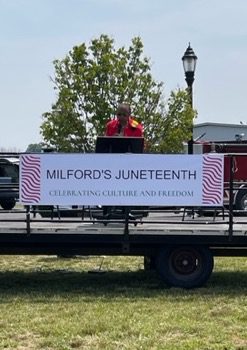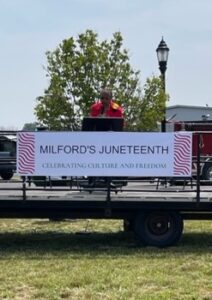Fourth Ward councilpersons Katrina Wilson and Jason James led the first Juneteenth celebration in Bicentennial Park on Monday, June 19. The celebration offered vendors providing items for sale as well as information on various organizations.
“Juneteenth is about where we came from, but also about what we’re doing to start this thing out putting God first,” Elder Oscar Walker of Williams Chapel in Bridgeville, said before leading the group in prayer. “It says ‘seek first the Kingdom of God and all these other things that we seek for will be added”
After Elder Walker completed his prayer, Dr. Reba Hollingsworth spoke about the history of Juneteenth. Dr. Hollingworth pointed out that Juneteenth did not become a holiday until June 17, 2021 when President Joe Biden signed a bill making it a national holiday. On October 10 of the same year, Governor John Carney signed a bill making it a state holiday as well.
“It’s a holiday for everybody, not just black people. Juneteenth actually is one of the oldest known celebrations, commemorating the ending of slavery in the United States,” Dr. Hollingsworth said. “Although the Emancipation Proclamation was issued on January 1, 1863, it did not immediately free all enslaved people in the United States.”
Dr. Hollingsworth explained that Texas was seen as a safe haven for slaves even though the Emancipation Proclamation was issued which freed all slaves in Confederate states effective January 1, 1863.
“It wasn’t until June 19, 1865, when several union regiments of the United States Colored Troops, led by General Gordon Granger marched along with more than 2,000 Union Congressional soldiers, traveled to Galveston, Texas to take control of the state with the news that the war had ended, and that the 250,000 enslaved people were now free,” Dr. Hollingsworth said. “Major Granger said the people of Texas were informed that in accordance with a proclamation from the executive of the United States, all slaves are free. This involves an absolute equality of personal rights and rights of property between the former masters and the slaves, and the relationship heretofore existing between them, becomes that between employer and hired labor.”
The freedmen were advised to remain quietly in their present homes and work for wages, told not to collect at the military post nor should they be “idle.” Many of those living in Texas at the time were unaware that slaves had been granted freedom by President Abraham Lincoln two years earlier. Dr. Hollingsworth commented that the white slave owners were aware, but they had not informed their slaves that they were free.
Although Dr. Hollingsworth mentioned that President Lincoln had given credit to freed black men who fought during the Civil War, she also pointed out that his motives were not entirely based in abolitionist thinking.
“There is evidence that suggests that Mr. Lincoln’s proclamation was a tactical move designed not to free the more than 3,204,313 slaves in the United States until he could gain what he wanted, but he wanted to keep them slaves as long as possible, until he gained the support of his real plan,” Dr. Hollingworth said. “Lincoln wanted to free negroes gradually and to ship them out of the country to deport them, to move on what he called “racial cleansing” of the United States of America. Like Martin Luther King, Lincoln had a dream. His dream was to have a lily white America without negros and Native Americans. He tried to maneuver to fulfill his dream of ensuring that negros left America as a body as the Hebrew children left Egypt, Abraham Lincoln, like many white people in 1800s, was known to use the N word all the time in both public and private.”
After his election, President Lincoln had to deal with the issue of slavery, Dr. Hollingsworth continued.
“President Lincoln conceived the plan for emancipation of the slaves through compensation to slave owners by the United States government. Since Delaware, was the smallest of the slave holding states, holding only 1,790 slaves, he decided to submit a proposition to the state of Delaware,” Dr. Hollingworth said. “The proposition was that the government of the United States would pay the State of Delaware the sum of $900,000 so that there would be a gradual emancipation of slaves from year to year, extending over the period of 10 years. And that the payment that the United States will give to Delaware would pay the slave owners the value of the emancipated slaves. The Proposition passed in the Senate but it did not pass in the House. After that, President Lincoln and the Republican party were unpopular in Delaware.”
Hollingsworth gave her take on Lincoln himself suggesting that he may have been confused about his own racial identity because he had darker skin. She stated that there were 12 presidents who have admitted to having Negro blood, but, in her opinion, all people had Negro blood in their DNA. She continued that great pressure was brought on President Lincoln to free slaves at the outbreak of the Civil War.
“But he refused in his inaugural address, he repeated his often-made statement that he had no wish to interfere with slavery where it already existed. His concern was to preserve the Union and to prevent the secession of the southern states,” Dr. Hollingsworth said. “President Lincoln proposed the constitutional amendment to the emancipation of slaves by the year of 1900. Now, God knows that Lincoln did not want to issue an executive order to emancipate the slaves, but he had to face facts. He could no longer dodge the issue. The Senate Republicans staged a revolt and threatened to bring down his government. Lincoln realized that he was on the brink of destruction. In order to save the Union, Lincoln had only one option and that was to issue the Emancipation Proclamation. He knew that if he failed to sign this proclamation, he would then be in rebellion in the north.”
In order to appease his supporters in the North, President Lincoln played politics with southern slave owners, making deals that exempted them from freeing slaves in areas that heavily depended on the practice, Dr. Hollingsworth explained.
“He shrewdly crafted the Emancipation Proclamation to reestablish slavery in favor of the southern masters. In a word, he re-enslaved some 500,000 slaves,” Dr. Hollingsworth said. “In his own words, Abraham Lincoln said, the Emancipation Proclamation did not in and of itself, and would not make a single Negro free beyond our military reach. Lincoln broke faith with the slaves.”
The fact is that the Emancipation Proclamation only freed slaves among the rebellion states, but did not in border states that had not joined the Confederacy, including Delaware, Dr. Hollingsworth stated. It was not until the ratification of the 13th Amendment in December 1865 when slaves were officially freed in Delaware.
“Lincoln has been enshrined as the Great Emancipator who freed the Negro slaves at the stroke of midnight with a pen. What a myth. The Emancipation Proclamation was a mirage, an illusion. It was only a promise of freedom and action to appease whites who opposed the freedom of slaves and thought the freedom of slaves would be a threat to the American democracy. His reward for signing the emancipation was his assassination,” Dr. Hollingsworth said. “That is scam us to me, that America, blacks and whites alike, are totally misinformed about the myth of emancipation of slaves in the United States. We celebrate Jubilee Day on the first day of January each year, believing that Abe Lincoln signed the document that freed the slaves on January 1, 1863. We celebrate Juneteenth on June 19, because that is the day in 1865 that the slaves in the remote areas of Carrollton, Texas were told that President Lincoln had freed the slaves. This day is also known as Emancipation Day, Freedom Day and Jubilee Day.”
Dr. Hollingsworth pointed out that the freeing of the slaves did not end the struggle between black and white races. Jim Crow laws, the Ku Klux Klan, lynchings, and race riots continued for more than 60 years after the freeing of slaves. People of color also continued to face police brutality, police harassment, mistreatment of their young and other horrific events. The passage of the Civil Rights Act of 1964 made some changes and improved areas of racial relations, but there is more to do, according to Dr. Hollingsworth. Councilwoman Wilson was excited to be part of such an important event which she felt was a step toward improving those relationships.
“I’m so happy to be hosting our first Juneteenth Celebration. This is a wonderful opportunity for us to celebrate our heritage, culture and each other. I have been on city council for almost 30 years representing the people. At this time, I would like to acknowledge those African Americans who served on Milford city council before me. William Penn Fountain, Douglas Gibson, Franklin Fountain, James Starling, Sr.,” Councilwoman Wilson said. “As you see the city of Milford has been culturally diverse for many years. I want to just thank everyone for coming. Let’s enjoy being us and continue to celebrate and lift each other up every day. That’s what it’s all about. Lift our brothers and sisters and all mankind up and the world definitely is gonna be a better place.”
Mayor Archie Campbell also thanked everyone for coming out to the event. Both he, Councilwoman Wilson and Shawn Hinton, the first black fire chief at Carlisle Fire Company were presented with plaques commemorating their service to the city.
Share this Post




